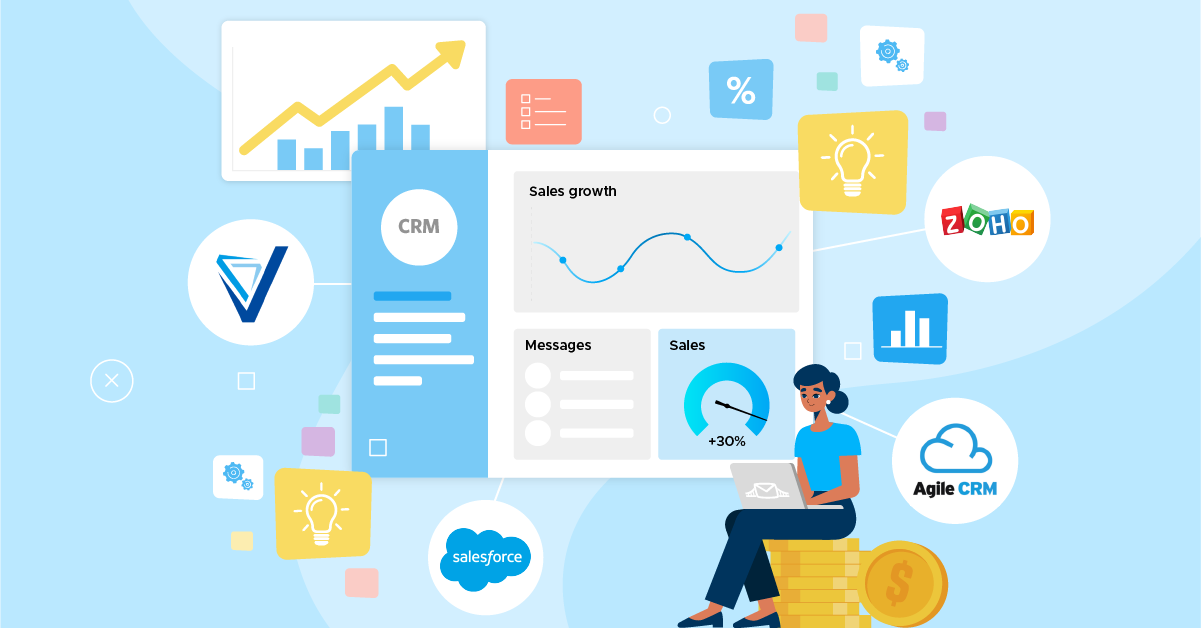
As their client list grows, most businesses in the financial services industry find themselves needing a Customer Relationship Management (CRM) tool to help them manage prospects, leads, and existing clients.
CRMs can be essential in helping you to identify and nurture leads and best service clients. You can do everything from seeing when to follow-up, tracking client concerns, and recording information (desired risk level for their portfolio or even the names of their two kids for relationship-building purposes) about their financial profile.
However, not all CRMs work well for the financial services industry. These businesses work with specialized and sensitive information, and many benefit directly from CRMs that directly suit their needs.
If you’re in need of a CRM for financial services businesses, you’re in luck. We’ve done all the research so you won’t have to. Let’s discuss the best CRM for financial services options, including CRMs for insurance providers, financial advisors, banks, and finance brokers.
Why financial services need CRMs
If you work in the financial services industry and are wondering if you need a specialized CRM, the answer is yes. And you can trust us on that; we’re not a CRM company, so we have no leg in this race.
Every client that you work with will be so individualized when you’re looking at finances.
You could have two clients looking for advice about buying a $500,000 house, for example, but one is a married couple who wants to have kids in a few years that would put that price out of reach and another is a single, small business owner who makes 250k a year. Same goal but very different clients.
Keep in mind, too, that many CRMs are cloud-based and adhere to cloud security standards, ensuring high security, especially when you’re enabling two-factor authentication and using strong passwords. This is true even when your team members are working from remote locations. Every fintech app development company is growing more wary of potential threats so they employ the latest technology to battle them.
When it comes to financial services CRMs, there are two large sub-industries that fall under this category, both with specific needs and capabilities: banks and financial advisors.
How to choose the best CRMs for banks
Banks use CRMs to increase productivity and departmental synergy, personalize the customer experience, and improve lead conversion rates. Furthermore, with all industries adapting to mobile accessibility, banking CRMs are developing apps, which have helped increase employee productivity by 15%.
How to choose the best CRMs for financial advisors
Financial advisors have similar needs as banks, but the best CRMs for financial advisors focus on providing their wealth management teams more freedom to focus on clients. CRMs help keep client prospecting and nurturing organized so financial advisors can accomplish their two main goals: attract new clients and maintain existing clients.
Additionally, integrating robust accounting software for financial services into these systems can further enhance the precision and efficiency of financial advising by offering comprehensive financial analysis and reporting tools.
So whether you’re approving clients to get loans, helping them manage their retirement portfolio, or even just helping them to set up their first accounts, you want to have the full client picture and the accounting services proposal when you’re assisting them. Every branch and section of this industry needs a specific CRM for their financial services. By incorporating efficient FP&A finance strategies, financial service businesses can enhance their CRM usage, streamline operations, and support successful finance transformation initiatives across all departments, especially enhancing data-driven decisions.Learn more about financial advisor marketing strategies.
Benefits of CRM for financial services providers
CRM systems offer significant advantages for financial services providers, helping them improve client relationships, streamline operations, and enhance overall business performance. This operational streamlining often involves integrating the CRM with other essential tools, such as expense management software. Key benefits of CRM for financial services providers include:
- Improved client management: CRMs centralize customer data, enabling personalized service by tracking client interactions, preferences, and financial goals.
- Enhanced customer experience: CRMs help deliver timely and relevant communications, improving client satisfaction and retention through tailored services and proactive outreach.
- Increased efficiency: Automated workflows, reminders, and reporting features streamline tasks like follow-ups, lead management, and compliance tracking, reducing manual effort.
- Better data analysis: CRMs provide insights into customer behaviors and financial trends, allowing providers to identify opportunities for cross-selling, up-selling, and improving customer segmentation.
- Regulatory compliance: CRM systems help financial service providers manage and document interactions, which is crucial for adhering to industry regulations and audit requirements.
- Stronger client relationships: By providing a comprehensive view of the client’s financial history, goals, and interactions, CRMs enable deeper, more meaningful engagement.
In summary, CRMs are essential for financial services providers to drive growth, increase client loyalty, and stay competitive in a data-driven industry.
Creating a CRM strategy for financial services
Creating a CRM strategy for financial services involves several key steps to ensure it aligns with business goals and enhances customer relationships. Here’s a summary of the main steps:
- Define business goals: Identify specific objectives for your CRM strategy, such as improving customer retention, increasing cross-selling opportunities, or enhancing customer service efficiency.
- Understand customer needs: Analyze your customer base to understand their preferences, behaviors, and financial needs. This will help in designing a personalized and targeted approach.
- Segment your customers: Divide your clients into segments based on factors like demographics, financial goals, or value to the business. This enables more tailored communication and services.
- Choose the right CRM software: Select a CRM system that meets the specific needs of your financial services business, such as client management, regulatory compliance, and data security.
- Integrate with existing systems: Ensure the CRM integrates with other tools you use, such as accounting software, marketing automation platforms, or regulatory systems, to streamline workflows and improve data consistency.
- Automate processes: Use CRM automation for tasks like lead generation, follow-up reminders, and compliance tracking, allowing your team to focus on high-value interactions.
- Train your team: Provide thorough training to employees on how to use the CRM effectively, ensuring they understand its features, workflows, and customer management benefits.
- Monitor and optimize: Regularly review CRM performance through data analysis, feedback, and KPIs. Adjust your strategy and processes as needed to improve efficiency and achieve your goals.
By following these steps, financial services providers can create a CRM strategy that enhances customer relationships, improves service delivery, and drives business growth.
Best CRMs for financial services
Let’s take a look at some of the best options when it comes to CRMs for financial services. Below there is a full list of the best CRM on the market that at the moment are integrate with LeadsBridge, an honorable mention goes to BIGContacts that is a simple, relationship-focused CRM that’s built for small businesses and teams that want to stay organized without the clutter of an enterprise setup. It brings your contacts, conversations, follow-ups, and pipeline into one place, so you are not chasing context across inboxes and spreadsheets.
1. Zoho CRM
Zoho is one of the most popular CRM tools on the market today.
In addition to being able to view leads based on factors like whether they’ve accepted a deal, their last activity date, and their general email sentiment, they have an integrated suite of features for businesses in the financial industry.
As you can see in the image below, you can use this software to track a client’s annual revenue, stock purchases, investment analysis, and more. This is information you can keep on file to reference, while also scheduling meetings, responding to questions, and sending emails to your clients.
Zoho provides some exceptional customization options, including:
- Your team has the ability to assign activities or contacts to different team members
- Set task deadlines to ensure your clients are always cared for promptly
- View open and closed activities, deals, invoices, and sales orders
Like all the tools on this list, Zoho CRM syncs up with LeadsBridge and our other integrations. Some possibilities include:
2. Salesforce
Salesforce® is another one of the big names in the CRM field, and like Zoho CRM, they offer specialized CRM tools for the financial industry. Salesforce®’s customizations include banking CRM software and features only provided by Salesforce® for financial advisor CRMs.
Some of their standout features include the following:
- Collecting and analyzing the information needed for improved wealth management advice for their clients
- Streamlining loan application processes, including easy-to-analyze risk areas and options to educate borrowers
- Security designed to adhere to strict industry requirements
Salesforce®, like Zoho CRM, has multiple integrations through LeadsBridge, including:
Discover the best Saleasforce® integrations here.
3. Velocify
Velocify is specifically a mortgage sales CRM, which prioritizes streamlining the mortgage application and underwriting process for both the loan applicant and the lender. This can help convert mortgage leads quickly.
Some of the standout features of this tool include:
- Gaining access to leads from over 1,400 different sources
- Automatically distributing new leads, or reassigning existing leads based on workload
- Delivering automated texts and emails to encourage users to complete their loan applications
- Incentivizing referrals from existing or past clients
Some of Velocify’s most useful integrations through LeadsBridge include:
4. Agile CRM
Agile does not offer CRM features specifically for businesses in the financial services industry, but it’s still a highly resourceful tool that we’re happy to recommend for small, private businesses. Many financial advisors, after all, don’t need enterprise-level software if they’re working independently or on a small team. They need affordable CRM software that will meet several different needs.

Some of their standout features include:
- End-to-end business management, so you can use the tool for customer support, lead tracking, and marketing automation
- Sending actionable data to everyone on your team, including the ability to view every customer interaction in real time
- 50 different sales automation features to streamline the digital sales funnel and lead nurturing process
- Marketing features like a social suite, dynamic web forms, and email marketing
Some of LeadsBridge’s most popular integrations with Agile CRM include the following:
5. Wealthbox CRM
Wealthbox is a CRM designed specifically for financial advisors that works just as efficiently on a desktop as it does on a mobile device. With “wealth” in the name, it is easy to think of this CRM as a wealth advisor CRM that can always be a few clicks away in your pocket.
The Wealthbox CRM is efficient because of its easy to use interface, numerous features, and organized data streams, separating clients, prospects, leads, and coworkers.
Some of their standout features include the following:
- Easy and assisted CRM transitions from previous companies
- A unique social media feature to stay intricately connected with coworkers
- Opportunity tracking that helps visualize your business through stages, users, or closing dates
- A complete file storage process equipped with designated permissions
Wealthbox CRM has multiple integrations through LeadsBridge, including:
6. HubSpot CRM
Small businesses are choosing HubSpot for financial services because it is free and packs more punch than most CRMs on the market. The HubSpot CRM syncs up seamlessly with Microsoft Outlook and Gmail and offers automatic tracking of customer interactions.
While large companies will need to explore HubSpot’s expensive premium options, the free version offers everything a small business could ever want from a CRM.
Some of their standout features include the following:
- It’s FREE! HubSpot offers the core essentials at no cost.
- Customizable dashboard that allows you to track based on metrics of your choosing
- Offers an unlimited amount of users and storage that can reach up to a million contacts.
- Up-to-the-minute views of your entire sales pipeline
HubSpot has multiple integrations through LeadsBridge, including:
7. Redtail CRM
The Redtail CRM is able to lay claim to being the first cloud-based CRM for financial advisors and continues to strive to always be operating on the forefront of the industry. Redtail offers an automated workflow, an intuitive user interface, and a plethora of viable integrations.
Unlike most financial service CRMs, the Redtail CRM is a subscription-based service that allows up to 15 database users for one monthly cost. With these additional users, Redtail offers free customer service and guidance to help your company succeed.
Some of their standout features include the following:
- Electronic document storage linked directly to client/contact records
- Email archives that specialize in retention for increase compliance
- Direct communication with clients while maintaining compliance procedures
Redtail has multiple integrations through LeadsBridge, including:
8. Microsoft Dynamics CRM for financial services
Microsoft Dynamics CRM is a robust customer relationship management platform tailored to meet the specific needs of financial services providers. It helps organizations manage client relationships, automate processes, and deliver personalized, high-quality service across banking, insurance, wealth management, and other financial sectors.
The main features of Microsoft Dynamics CRM for financial services include:
- Provides a holistic view of each customer, including financial history, interactions, preferences, and account details, allowing personalized service and relationship management.
- Ensures that client data is protected with built-in security features and compliance tools, essential for meeting industry regulations and financial reporting standards.
- Seamlessly integrates with Microsoft 365 (Outlook, Teams, Excel) and Power BI for enhanced reporting and collaboration.
- Provides actionable insights through built-in analytics and artificial intelligence, enabling predictive analysis for customer behavior, risk management, and opportunity identification.
LeadsBridge offers multiple integrations with Microsoft Dynamics CRM for financial services, including:
Final thoughts: How to choose the best CRM for financial advisors & services
When you’re using a CRM –whether it’s for financial advisors, brokers, banks, or lenders– it’s important to choose a tool that will work for you both now and in the long term.
Look for a financial services CRM that will scale alongside your business. This can include offering extensive integrations for automation and improved functionality (you can see more integrations available through LeadsBridge here), along with the capacity to handle the number of leads, clients, and contact data you want to store.
And finally, invest in a high-quality, well-known CRM tool that’s certain to be highly secure. Privacy and security should be of the utmost concern when you’re handling clients’ financial and personal information. When selecting the best CRM for financial advisors and services, it is important to consider the requirements for internal control to ensure the CRM is suitable. Additionally, consider offering identity theft insurance as part of your security strategy to protect both your clients and your business from potential breaches or fraudulent activity.
All of the tools discussed above meet these criteria, and they all offer free trials or demos. Take a look and see what works for you!
Looking for more services to help you scale your business in the financial sector with automation? See LeadsBridge’s financial services and solutions here.





























